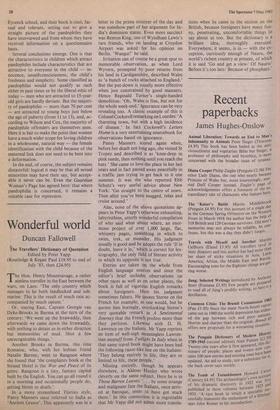Wonderful world
Duncan Fallowell
The Hon. Henry Mountsavage, a rather aimless traveller in the East between the wars, on Laos: 'The only country which manages to be both landlocked and sub- marine. This is the result of much rain ac- companied by much opium.'
Or, staying East, Captain Georgie van Dyke-Brooks in Burma at the turn of the century: 'We went up the Irrawaddy, then afterwards we came down the Irrawaddy, with nothing to detain us in either direction but immensities of mud. Shot a few unrecognisable things.'
Another Brooks in Burma, this time Romaine, who, with her lesbian friend Natalie Barney, went to Rangoon where she found that 'the complaints book at the Strand Hotel is the War and Peace of its genre. Rangoon is a tiny, fantasy capital built by the English. You can go all round it in a morning and occasionally people do, getting bitten to death.'.
In a more streamlined Thirties style, Pansy Manners once referred to India as `Ancient Grease'. This apparently was in a letter to the prime minister of the day and was somehow part of her argument for In- dia's dominion status. Even more succinct was Renton King, one of Wyndham Lewis's rare friends, who on landing at Croydon Airport was asked for his opinion on Berlin. Wangst!' he said.
Irritation can of course be a great spur to memorable observation, as when Lord Wyvern, prompted by poor returns from his land in Cardiganshire, described Wales as 'a bunch of rocks attached to England.' But the put-down is usually more effective when just constrained by good manners. Hence Reginald Turner's single-handed demolition: 'Oh, Wales is fine, but not for the whole week-end.' Ignorance can be very revealing too. A classic example of this is Colonel Cockerell remarking on Lourdes: 'A charming town, but with a high incidence of disease.' In fact Cockerell's Letters Home is a very entertaining sourcebook for observations based on ignorance.
Pansy Manners scored again when, before her death not long ago, she visited St Tropez and described it as 'knee-deep in pink suede, then nothing until you reach the hats.' She came to love the place in her last years and in fact passed away peacefully in a traffic jam trying to get back to it one summer. It was she who reported Ebb Schutz's very useful advice about New York: 'Go straight to the centre of town. Then after you've been mugged, relax and cruise around.'
Alas, none of the above quotations ap- pears in Peter Yapp's otherwise exhausting, labyrinthine, utterly wonderful compilation of who said what about where, an enor- mous project of over 1,000 large, flat, whispery pages, something in which to swim, trek, or meander. His judgment usually is good and he adopts the rule 'If in doubt, leave it in,' which is correct for lex- icography, the only field of literate activity in which its opposite is not true.
Entries are taken on the whole from English language sources and since the editor's brief includes observations on other races as well as on other places, the book is full of vigorous English remarks about foreigners. Here his judgment sometimes falters. He quotes Sterne on the French for example, as one would, but he quotes him boringly, overlooking Sterne's very quotable remark in A Sentimental Journey that the French profess more than they perform. Likewise with D. H. Lawrence on the Italians. Mr Yapp reprints an item of well-nigh meaningless Lawren- tian auspuff from Twilight In Italy when in that same travel book might have been had the following razor-like line on the Italians: `They belong entirely to life, they are so limited to life, these people.'
Missing entirely, though he appears elsewhere, is Aldous Huxley who wrote cleverly on the same subject. Here he is in Those Barren Leaves: ' . . . by some strange and malignant fate the Italians, once arriv- ed at baroque, seem to have got stuck there.' In this connection it is regrettable that Mr Yapp did not admit more transla- tions when he came to the section on the British, because foreigners have many fun- ny, penetrating, uncomfortable things to say about us too. But the dictionary is a brilliant idea, thoroughly executed. Everywhere, it seems, is in — with the ex- ception, curriously enough of Nauru, the world's richest country at present, of which it is said `Go and get a view/ Of Nauru/ Before it's too late/ Because of phosphate.'










































 Previous page
Previous page